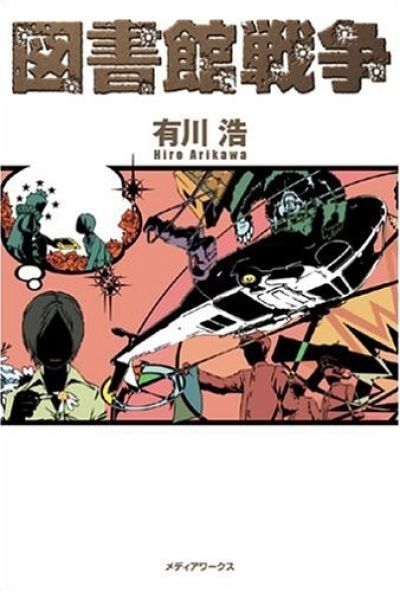Reading Books of Old
The Library War (The Library War, volume 1)
By Hiro Arikawa

27 Jan, 2021
0 comments
2006’s The Library War (Toshokan Sensō) is the first volume in Hiro Arikawa’s Seiun-winning Library War novel series.
In the last year of the Shouwa period, the Media Improvement Act provided the Improvement Special Agencies of the Ministry of Justice with sweeping powers of censorship and confiscation. Since criticism of the Act fell within the scope of the Act, legal reform of the Act is unlikely. Protecting Japan’s literary world therefore fell to the nation’s libraries, who soon found legal pretexts both to claim the right to assemble inclusive archives and more importantly, to arm their Library Defense Force. There will be no repeat of the Nightmare at Nino!
The libraries follow four core principles.
Declaration of Library Freedom
- Libraries have the right to gather materials freely.
- Libraries have the right to make materials freely available.
- Libraries protect the privacy of their users.
- Libraries oppose all censorship.
Iku Kasahara was always bookish. This led her into direct conflict with the jack-booted thugs who enforce the Act. Just as she had her hands on the final volume of a long-running fantasy series, it was deemed not in the public interest due to the use of a certain word. All copies were to be confiscated and destroyed. Only the timely intervention of a Library Defense stalwart allowed Iku to obtain and read the treasured book.
Kasahara doesn’t have much memory for faces, so she has long since forgotten what her prince looked like. Nevertheless, she was so impressed by his heroism that she decided to become a librarian herself, much to the alarm of her rustic parents, who have an entirely accurate view of the hazards involved in Japanese library science. Perhaps some day she will meet her prince again! And if she is very, very lucky, she might even recognize him.
Spoiler: despite being his subordinate, she never connects her heroic prince with her despised superior Doujo.
Kasahara’s other defining feature is that she has always been very athletic (something that confounded her schoolmates, who found it very hard to imagine a jock who liked reading). Indeed, she scores higher on her physical tests than every other woman in the library services; her scores are even higher than those of most of the men. This is enough to earn her a spot in the elite Library Task Force.
Kasahara discovers the reality of the LDF is very different from the cinematic heroism she imagined. While the rationales for action in the Agency-LDF war sometimes involve insane troll logic, both sides do in theory restrict themselves to legal activities. Kasahara is dedicated and passionate, which means that she’s tempted to skirt the edge of what’s legal. Coming to grips with the practical limits on her authority is quite difficult for Kasahara.
Practical limits will soon be a dominating theme in her life. The LDF has many contingency plans. None of them, however, appear to have foreseen that the pro-censorship forces would slip one of their own into a senior position in the LDF. How can a loyal member of the LDF resist the LDF’s enemies when one of those enemies is giving the LDF its marching orders?
~oOo~
Probably nobody behind the Media Improvement Act or the people opposing it set out to create a Japan with an ongoing low-grade but legally sanctioned civil war between the book-burners and the librarians. Perhaps there is a lesson here about unintended consequences?
Notice how I call Kasahara bookish but not smart? It turns out there’s a huge gulf between reading a lot of books and being intellectually gifted. Kasahara is extremely passionate, and exemplary at most physical tasks (although she’s not especially talented at shooting), but anticipating consequences is not her forte. This makes for many painful learning experiences.
There’s a movie!

Which I have not seen. It’s not on any service to which I have access, as far as I can tell.
This novel is rather episodic, but it does eventually find its way to thrilling confrontations between the book-burners and the LDF. As you know, running gun battles are the mark of quality literature. Because I am reading this novel in (what I assume is not an authorized) translation, it’s hard to judge the original prose but the plot moves along nicely enough. Plus, books!
As far as I know, Library War has no sanctioned translation.
